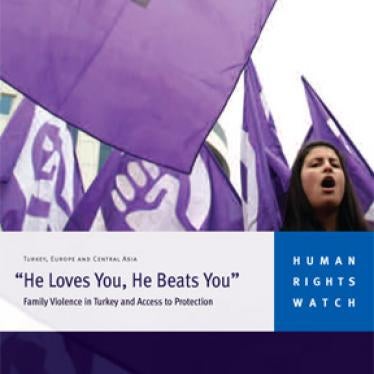As told by Gauri van Gulik, researcher and advocate, Women's Rights Division
Unlike some of the other women I spoke with, Hamiyet was not injected with poison, thrown from the roof or stabbed by her husband. But her story seemed just as desperate when she described the daily routine of abuse - thrashings that began on her wedding day, 24 years ago.
A 15-year-old bride, she lived with her in-laws who treated her like a slave, forcing her to cook and clean for their 12-person household. After she washed the laundry, her father-in-law slapped her hands with a stick, knowing it would hurt more as her hands were wet and cold.
Every evening, her husband beat her after he returned from work.
In the years that followed, he beat her when she was pregnant with each of their nine children. Once, he hit her in the stomach. He locked her in the bedroom and only allowed her to leave the house if he or his mother accompanied her - even to buy groceries. He forced her to haul stones and parts of trees to build a shed.
IN TURKEY, 42 PERCENT of women have experienced physical or sexual violence at the hands of their husband or partner, according to a study by a leading Turkish university. While the government can be credited with passing strong laws to protect women, these laws are rarely enforced, and additional protections are needed.
Hamiyet, a Kurdish woman with round cheeks and a friendly face, told me her story over Turkish tea and cookies. Her daughter, a nurse, sat beside her. Hamiyet described her husband's rage and loss of control when he hit her, and how she sometimes feared for her life. Occasionally, she said, her husband would compliment her cooking, giving her hope that the abuse would stop. It didn't.
Toward the end of our conversation, Hamiyet grew quiet and stared at the ground. In a low voice, she admitted that her husband raped her almost nightly.
At her daughter's behest, four years ago Hamiyet went to the police.
SHE SOUGHT HELP from the police numerous times. They always sent her back home - even when she approached police officers in the hospital where she was treated after one of her husband's attacks. Sometimes they laughed at her. Other times, concerned with preserving "family unity," they tried to reconcile her with her husband. Once they even called him.
She finally asked a prosecutor to place a restraining order against her husband. But while she was in the prosecutor's office, another man stood up and screamed, "Aren't you ashamed to talk about your husband like this!"
She left without the order. Later, a non-governmental organization helped her get a protection order, but it was never enforced.
In Turkey, spousal abuse occurs across all regions and income levels. In an effort to combat this situation, beginning in the 1990s, the government passed a series of reforms designed to protect women. Under these reforms, police officers and courts can require abusers to move out of the home, stay away from the victim and their children, and stop contacting the victim.
But the laws exclude women who are unmarried, divorced, or in unrecognized religious marriages.
Furthermore, officials often fail to enforce these laws. During our research we interviewed, or accessed the case files of, 40 abused women. We found no instances in which officers checked on abused women weekly, as required. Even worse, we found that officers often didn't respond to calls from women whose husbands returned home and threatened them.
Although the laws require shelters to be established for abused women, a shortage of shelters remains.
Having laws on the books that aren't implemented can be more dangerous for women than having no such laws. Once an abused woman's husband learns she's sought police help, his anger could become deadly. In Diyarbakir, a woman named Fatma was murdered after she sought help from the police. Hamiyet told us that the beatings intensified after she went to the police, and that her husband began threatening their daughter.
THE BRIGHT SPOT in this situation is that Turkish women are organizing. Small, fierce women's rights groups are leading women through the system and insisting that authorities help abused women. A nongovernmental organization, Van Women's Association, gave Hamiyet legal assistance and helped her find a tiny apartment and move out of her home.
Human Rights Watch is helping these organizations press for change. We were present last month as ministers from countries all across Europe gathered in Istanbul to sign a new Council of Europe convention on domestic violence. Turkey signed the convention, and we'll pressure the government to enforce it. We're also working with government officials charged with creating police school curriculum, so officers can better protect abused women, and with the ministry of women and family.
Although Hamiyet found some help, a deep sadness came over me when she talked about her life - her situation seemed so desperate. True, she left her husband and is seeking a divorce, but he knew where she lived and was stalking her. The police were no help. She had very little money.
I tried to end our conversation on a lighter note, by noting how well her daughter was doing.
While describing her abuse, Hamiyet often needed to pause and collect herself, but at the mention of her daughter, one of her five surviving children, she started sobbing. She wanted a better life for her. The moment reinforced why I did this report - so that girls who grow up with family violence don't have to repeat the pattern in their own marriages, or that if they do, they can successfully seek help.
***
To support programs like these, please donate to Human Rights Watch. Together, we are making a difference.


